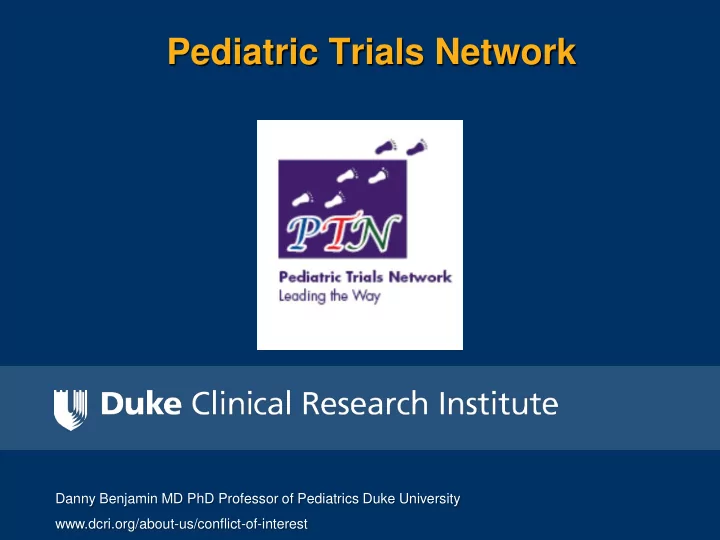

Pediatric Trials Network Danny Benjamin MD PhD Professor of Pediatrics Duke University www.dcri.org/about-us/conflict-of-interest
Pediatric Drug Development 1998: essentially no trials Mandate (Pediatric Research Equity Act) Incentive (Exclusivity) Virtually no studies in young infants Off Patent (Best Pharmaceuticals Children Act) Authorization by Congress NICHD sponsored trials 2002-2010 6 molecules, one trial enrolled on-time 2
What Is The Pediatric Trials Network PTN? Sponsored by the Eunice Kennedy Shriver National Institute of Child Health and Human Development (NICHD) The primary objective of the Pediatric Trials Network: Create an infrastructure for investigators to conduct trials that improve pediatric labeling and child health. PTN is studying product formulation, drug dose, efficacy, safety, and device validation Evidence of success will be completed trials that improve dosing, safety information, labeling, and ultimately child health 3
Pediatric Trials Network (PTN) 2011 Project Date Signed Protocol� Status Open� to� enrollment TO1 Administration Oct 2010 NA NA TO2 - Hypertension protocol Oct 2010 Protocol� Complete NA TO3- Metronidazole Dec 2010 Protocol� Complete Complete TO4 - Hydroxyurea May 2011 Interim analysis on time Protocol� Complete TO5 Acyclovir Jun 2011 Protocol� Complete Interim analysis, on time TO6 Opportunistic (POPS) Aug 2011 Yes, on time Protocol� Complete TO7 -Lisinopril PK Aug 2011 Protocol� Complete Yes, on time TO8 -Tape Sep 2011 Complete Protocol� Complete TO9 -Midazolam Sep 2011 Protocol� in� draft NA TO10 Ampicillin Sep 2011 Protocol� Complete NA TO11 -Obesity Sep 2011 NA Protocol� Complete 4
Lessons Learned Main Contract Timelines Meropenem RFP release to Pediatric Trials Network RFP signature 24 months 3/2010, signature 6 months IND 31 months IND 7 months First patient 34 months First patient 9 months Last infant 48 months Last patient 18 months Clinical Study Report 60 Clinical study report 22 months from RFP release months from RFP release 5
Innovations and Track Record That Made it Go DCRI operations team — job vs. mission Contracting — risk to NIH and to investigators POPS IRB Meropenem — give it away to keep it Trial leadership and PI selection Per patient cost — between and within trial Success in first trial — support of NICHD Success in 2011 — support of the members Only decisions that impact timelines and budget 6
Protocol: POPS Pediatric Opportunistic PK Study Protocol Title: Pharmacokinetics of Understudied Drugs Administered to Children per Standard of Care Objectives: Evaluate the PK of understudied drugs currently being administered to children. Study Population: 500 children (birth-20 years) who are receiving understudied drugs of interest per standard of care as prescribed by their treating caregiver Study Duration: each child will participate in the study for up to 90 days per drug; study conduct for 3 years Number of Sites: 45 First Patient Enrolled: November, 2011
PTN and POPS Continued 15 therapeutics bundled into one protocol Samples stored locally and sent in batch Flexibility to add molecules Provide preliminary and supportive data for subsequent trials Compare to epi-data Metronidazole example Provide a testing ground for sites — enrollment Facilitate contracts and infrastructure — enrollment in between more traditional trials 8
Comparison Legacy Trials Pediatric Trials Network Legacy 10 years website 6 molecules 1 trial completed on time Pediatric Trials Network 30 molecules All trials on time and on budget to date 16 trials over 7 years requested, will have started 14 trials in 2 years 2 CSR Website www.pediatrictrials.org 9
Applications infectious disease trials Success in ID trials already POPS Site selection and reduce start up time Post-marketing safety Feasibility Interacting with industry Pharmaco-epi Piggyback of diagnostics 10
11
Recommend
More recommend